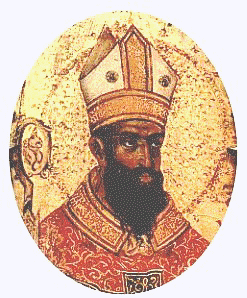By: Brian G. Chilton | February 24, 2020
Is Christianity a white man’s religion? This may sound absurd, but some individuals hold such a belief. Some claim such a position due to the practice of slavery by early antebellum Christians. Slaveholders would often persuade their slaves that being submissive is the Christian thing to do and that their blessings would come only in the afterlife. Professor Rasiah S. Sugirtharajah contends that the entire Bible is a colonial work used to subdue natives under the conquest of Christians.
However, a simple glimpse at church history quickly portrays a very different tale. African theologians have influenced the church remarkably throughout the centuries. Today, we consider three African theologians who left an indelible mark in Christendom.
Athanasius of Alexandria (AD 293–373). Athanasius was born in Alexandria, a grand metropolis of the early centuries, around AD 293. Alexandria was home to one of the largest libraries in history. Athanasius was called the “black dwarf” because of his height (which was around 5’ 2”) and his dark complexion. Athanasius played a key role at the Council of Nicea (AD 325) along with Bishop Alexander (Hindson and Mitchell, Popular Encyclopedia of Church History, 50). Athanasius influenced the church in three major theological ways: 1) the eternal deity nature of Christ, 2) Christian monotheism, and 3) salvation as a new creation of fallen humanity (Hindson and Mitchell, Popular Encyclopedia of Church History, 50). Athanasius was persecuted for his orthodox positions by being exiled five times by the Roman emperor. The church should be greatly appreciative of the work of Athanasius. Otherwise, Arianism (an ancient form of the Jehovah’s Witness movement) would have ruled the day.
Augustine of Hippo (AD 354–430). Augustine of Hippo was born in Thagaste (modern-day Algeria) in 354. His mother was a Christian, whereas his father was a local Roman official who later converted to Christianity shortly before his death. Some have contended that Augustine’s father may have been of a lighter complexion since he was a Roman and his mother quite dark since it is believed that she was of Berber descent (an ethnic group indigenous to North Africa). Thus, Augustine may have been a mixed-race and could have been of a dark complexion.
Augustine’s contributions to the church cannot be overemphasized. Edward Smither contends that Augustine impacted the church in three ways: First, by holding that the church was universal; second, by conferring a solution to the problem of evil; and three, by establishing a new preaching standard (homiletics) while mentoring other church leaders during his time. Through his voluminous writings, Augustine impacted several generations in the future.
Origen of Alexandria (AD 185-254). Origen of Alexandria was born to Christian parents in the metropolis of Alexandria, Egypt. While Origen is a controversial figure due to some of his questionable theology—including his belief that errors were present in Scripture and his modalistic view of trinitarianism—Origen did elevate the authority of Scripture and noted the great importance of careful exegetical interpretation. Origen was not unique in his emphasis on the tripartite view of Scripture—holding that there was a literal, moral, and spiritual meaning of the text. Augustine held a similar view. However, Origen abused the allegorical method by extracting some bizarre interpretations of Scripture. Nonetheless, Origen was an African theologian who impacted the church for many years to come.
As we come to the close of Black History month, it is important to note the contributions of African theologians throughout history. Being a Caucasian myself, I am distressed at how many individuals believe that Christianity only belongs to the European Western world. Christianity began with a Jewish carpenter/theologian in Asia. Yes, the Middle East is considered part of Western Asia. Then, the movement expanded into Africa, other parts of Asia, and into Europe. Eventually, Christianity made its way to the Americas, Australia, and Oceania. Therefore, it is both erroneous and anachronistic to claim that Christianity is a “white man’s religion” or that it is “European.” Rather, Christianity is a global entity belonging to people from all walks and races. If you need further proof, then look at the worship scene found in Revelation 7 where “a vast multitude from every nation, tribe, people, and language, which no one could number, standing before the throne and before the Lamb” (Rev. 7:9, CSB).
Source
Hindson, Ed, and Dan Mitchell, eds. The Popular Encyclopedia of Church History: The People, Places, and Events that Shaped Christianity. Eugene, OR: Harvest House, 2013.
About the Author
Brian G. Chilton is the founder of BellatorChristi.com, the host of The Bellator Christi Podcast, and the author of the Layman’s Manual on Christian Apologetics. He received his Master of Divinity in Theology from Liberty University (with high distinction); his Bachelor of Science in Religious Studies and Philosophy from Gardner-Webb University (with honors); and received certification in Christian Apologetics from Biola University. Brian is enrolled in the Ph.D. program in Theology and Apologetics at Liberty University and is a member of the Evangelical Theological Society and the Evangelical Philosophical Society. Brian has been in the ministry for nearly 20 years and serves as the Senior Pastor of Westfield Baptist Church in northwestern North Carolina.
https://www.amazon.com/Laymans-Manual-Christian-Apologetics-Essentials/dp/1532697104
© 2020. BellatorChristi.com.






[…] Source: Ancient African Theologians Who Impacted the Church […]